 Jakarta, April 15, 2019
Jakarta, April 15, 2019
The attention of the Central Government towards the Papua region over the past four years has been demonstrated by the implementation of massive infrastructure development. It is recognized that this development has succeeded in opening the isolation of citizens and increasing connectivity between regions. However, this connectivity has not yet been optimally utilized by indigenous Papuans as a means to develop the economy in the context of improving their welfare.
The Asia Foundation’s qualitative study (2018) shows that the new connectivity is more widely used by outsiders to increase the flow of consumer goods or commodities to be marketed to the indigenous Papuans. While the connectivity also contributes to an increase in the income of indigenous Papuans, making it easier to market their agricultural products, the increase is not significant. Therefore, the development of Papua needs to be focused on the development of human resources and self-reliance of the indigenous Papuans (OAP). This proposal was made by Erman Rahman from The Asia Foundation in the 2020-2024 RPJMN Discussion organized by PATTIRO on March 15, 2019, at the Aryaduta Hotel Jakarta. This activity is supported by The Asia Foundation through the Finding the Balance (FTB) program.
Erman said that the focus of Papuan development, going forward, should be aimed at building OAP’s self-reliance in economic capacity, education and health. “The development in Papua should be focused on developing OAP, reducing inequality, improving the quality of human resources, social relations and environmental sustainability. Not only economic development, but focusing on developing human resources,” said Erman.
Furthermore, Erman emphasized that infrastructure development is also important as a priority for supporting sectors, but it should be focused on small-scale infrastructure. “Infrastructure development as a supporting sector should be directed at small-scale infrastructure, such as the provision of clean water, electricity, sanitation, transportation of goods and people who can connect OAP with local markets,” Erman said.
In line with what was delivered by Erman, Dadang Solihin, Rector of Darma Persada University in Jakarta said that the development of human resources in Papua is very important. “Human resource development is very important in Papua, and community participation must be built. They have the ability, and what is needed is empowering the people. The three principles of empowering people are to protect, to enable and to empower. OAP already has the ability to live, so we must protect and provide opportunities for growth and empowerment,” said Dadang.
Oktorialdi, Expert Staff of the Minister of National Development Planning agreed with the proposal. “I agree that human development must be improved in Papua. The health, economic and education approaches have only been made on a small scale,” Okto said. In his presentation, Oktorialdi conveyed that one of the development targets of the Papua region in the technocratic design of the 2020-2024 RPJMN was the improvement of human resources competitiveness.
At the end of the discussion Bejo Untung, PATTIRO Program Manager, invited all parties to work together in formulating the Papua development plan. “Cooperation and cohesiveness, as well as synergy between all parties and stakeholders are very important in formulating the Papua development plan. We hope for more intensive communication in formulating the agenda for the future,” Bejo said.
Contributor: Fitria





